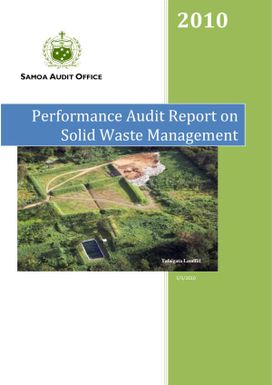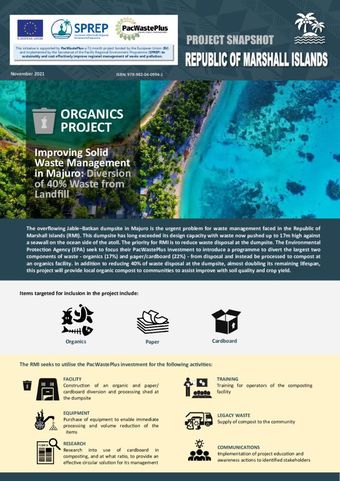Performance Audit Report on Solid Waste Management : Samoa
- Description:
- Solid Waste Management is widely recognized as a major concern for Pacific Island Countries (PICs) with the potential to cause negative impacts on national development activities including tourism and trade, public health and the environment. The introduction of the Waste Management Bill 2009 is an indication that Government recognizes the importance of proper waste management. The Ministry of Natural Resources and Environment (MNRE) is the agency that has the mandate to manage waste and ensure that any issues related to solid waste management are addressed appropriately.
- Display date:
- 2010
- Collections:
- Secretariat of the Pacific Regional Environment Programme (SPREP)
- Publisher:
- Samoa Audit Office
- Content partner:
- Secretariat of the Pacific Regional Environment Programme (SPREP)
- Availability:
- Not specified
-
Copyright status: All rights reservedFind out more about what you are able to do with this itemThis item is all rights reserved, with means you'll have to get permission from Secretariat of the Pacific Regional Environment Programme (SPREP) before using it. For more information, please see our use and reuse page.What can I do with this item?Non-infringing useNZ copyright law does not prevent every use of a copyright work, and this item may be hosted by an international institute or organisation. You should consider what you can and cannot do with a copyright work.No sharingYou may not copy and/or share this item with others without further permission. This includes posting it on your blog, using it in a presentation, or any other public use.No modifyingYou are not allowed to adapt or remix this item into any other works.No commercial useYou may not use this item commercially.
Related items
Welcome and warm Pasifik greetings
The information on this site has been gathered from our content partners.
The names, terms, and labels that we present on the site may contain images or voices of deceased persons and may also reflect the bias, norms, and perspective of the period of time in which they were created. We accept that these may not be appropriate today.
If you have any concerns or questions about an item, please contact us.

